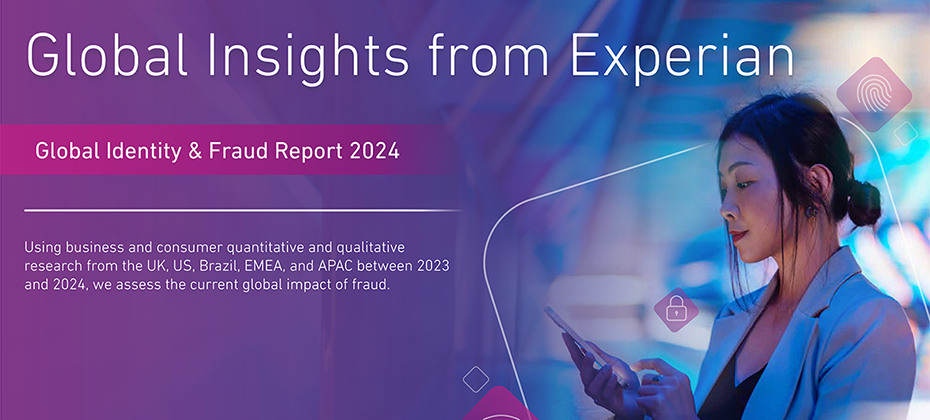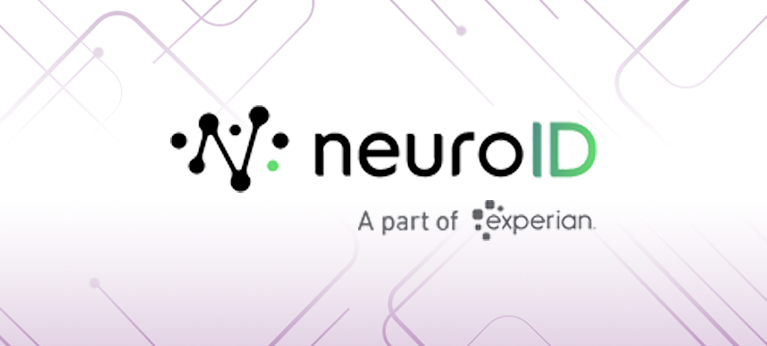Identity & Fraud
Experian uses data and the most advanced technologies to meet and keep up with the needs of its consumers, making us a leader in identity verification and fraud detection and prevention. Read about our latest identity and fraud news below:

As we kick off a new calendar year, there’s already a lot of buzz in terms of expected advances in tech, especially for artificial intelligence. And what about fraud? Fraud isn’t just keeping pace with technology—it’s racing ahead. As the digital world expands, so too do the cunning schemes of fraudsters, who are more innovative and relentless than ever before. With businesses and consumers increasingly at risk, staying a step ahead requires insight into what’s next. Today, we released our annual Future of Fraud Forecast to highlight five threats that could bring challenges this year for businesses and consumers. They include: Crypto highs and lows: Recent events have led to cryptocurrency like Bitcoin increasing dramatically in value. Experian forecasts that criminals will be more motivated to target consumers and crypto providers, leveraging tried-and-true schemes like investment and romance scams, as well as fake websites offering cryptocurrency in an attempt to swindle money from unsuspecting people hoping to ride the wave. Companies will need to leverage robust fraud prevention measures and provide educational resources for consumers to safeguard themselves from these scams. Pig butchering scams get meaty: A fraudster’s endgame is to make off with as much money as possible, and pig butchering scams are a prime way of doing so. Criminals will “fatten up” their victims by enticing them over time to participate in an investment scheme and then disappear with the money, leaving their victims with significant financial losses. This requires the fraudster to build a relationship with the victim and establish trust so they can convince them to hand over their bacon. While this type of scam already exists, Experian forecasts that criminals will find ways to produce results faster and in more convincing ways that will dupe people more easily and allow them to elude detection for longer. Is it a social media challenge or a crime? Social media has fueled viral products and trends that are typically great recommendations or life hacks. However, last year, a form of check fraud went viral that involved people recording themselves writing bad checks, depositing them at the ATM and withdrawing cash before the check bounced. Some participants in this trend may not have been fully aware of the repercussions. In reality, consumers were committing check fraud by joining the bandwagon. Experian predicts that social media users could perpetuate additional trendy financial fraud schemes with the fraudsters being everyday people instead of savvy criminals. Unhealthy password spraying: With the amount of personally identifiable information that healthcare companies have on consumers, Experian forecasts fraudsters will deploy large-scale password spraying cyberattacks using GenAI-created bots to attack healthcare companies at scale to gain access to a company’s systems and the personally identifiable information of employees and patients. Password spraying, also known as credential stuffing or credential guessing, is when an attacker applies a list of commonly used passwords against a list of accounts to guess the right password. This used to be done by humans but, as technology has become more sophisticated, so have the fraudsters. These attacks can now be fueled by GenAI — making the attacks exponentially larger, faster and harder to detect. A new generation of bots up the ante: Bot attacks are a well-known tactic used to defraud people and companies by carrying out repetitive instructions to perform a variety of fraud schemes. A new generation of bots has emerged, known as Gen4 bots. Typically built using AI tools and trained to emulate human behavior, these bots are notoriously more difficult to detect and have the potential to bypass firewalls and security with ease. Experian predicts that as Gen4 bot attacks grow, leveraging behavioral analytics will become table stakes for companies to identify and mitigate this type of automated fraud. Being proactive is paramount in the fight against these and other future fraud threats. Businesses should work with a trusted partner to ensure that they leverage the right data, advanced analytics and technology to mitigate risk. Experian offers identity verification and fraud prevention solutions available on the Experian Ascend Platform™ to help companies anticipate, prepare for and fight fraud. Learn more about Experian’s fraud prevention offerings here.

The rise of Generative AI (GenAI) is fueling a new wave of sophisticated fraud, transforming the financial services landscape. Experian’s 2024 Global Identity & Fraud Report highlights the challenges businesses face, and the strategies needed to protect consumers while maintaining seamless digital experiences. Based on insights from more than 1,000 business and fraud leaders, and 4,000 consumers worldwide, the report identifies three key forces shaping fraud prevention: GenAI-Powered Fraud: Fraudsters use AI to craft highly personalized attacks, exploiting vulnerabilities across the customer journey. Evolving Regulations: Stricter government requirements demand rapid adaptation of fraud prevention strategies. Customer Expectations: Consumers prioritize secure, efficient services. Many abandon brands after poor account-opening or transactional experiences. A Multi-Layered Defense The report emphasizes the need for a multi-layered approach to combat fraud effectively. Businesses are increasing investments in AI, machine learning, and data-sharing networks to detect and prevent fraud in real-time. “Fraud operates across borders and targets various points in the customer journey,” said Greg Wright, Experian’s Executive Vice President of Identity and Fraud. “Businesses must leverage advanced analytics and alternative data to stay ahead of these evolving threats.” Balancing Security and Experience Consumers value security, but demand convenience. Striking the right balance is critical, as many switch providers after experiencing delays or cumbersome processes. Businesses can succeed by: Using Advanced Analytics: Leveraging AI-driven insights to prevent fraud while maintaining smooth customer experiences. Orchestrating Fraud Prevention: Integrating tools to provide a 360-degree view of customers, ensuring fraud detection is seamless and comprehensive. The Path Forward The rise of GenAI fraud underscores the need for global collaboration and innovation. By adopting advanced technologies and prioritizing customer-centric solutions, businesses can protect consumers while fostering trust. Experian’s 2024 report offers actionable insights for navigating these challenges. Download the full report to learn how to outpace fraudsters while delivering secure, seamless experiences.

Fraudsters are opportunistic. They are capitalizing on using new technology to create more sophisticated fraud schemes, underscoring the importance and urgency of prioritizing fraud prevention strategies. In fact, the FTC reported that consumers lost more than $10 billion to fraud in 2023, the first time losses have ever been so high. As a leader in the fraud prevention and identity verification space, we’re dedicated to helping clients stay ahead of evolving fraud trends and challenges. To that end, today we released the findings of our 9th annual Experian Identity and Fraud Report, which provides an in-depth look at the current fraud landscape and the sentiments of both consumers and businesses. Some of the top findings include: Consumers’ top security concerns include: identity theft (84%) and stolen credit card information (80%), a 20% increase compared to 2023. Sixty-three percent of people say it is important for businesses to be able to recognize them online. Eighty-one percent of consumers say they’re more trusting of businesses that can accomplish easy and accurate identification. People want more types of identity recognition techniques used to verify their identities with physical analytics (71%), PINs sent to a mobile device (70%) and behavioral analytics (66%) evoking the highest sense of security for consumers. Companies recognize the importance of focusing on Gen AI, with 70% saying they expect AI fraud to be the second greatest challenge for their business. Despite AI fraud concerns, businesses ranked detecting and preventing Gen AI fraud and deepfakes as the 12th most important investment area behind prevention for legacy fraud types. With these fraud concerns in mind, companies need to review their current fraud tools and strategies, and look for opportunities to add to or change current approaches, to not only mitigate risk but also keep their customers safe while providing a positive experience. Businesses should work with a trusted partner who can help them implement a multilayered approach to identity verification and fraud prevention and help them meet consumer expectations. Experian offers a full suite of automated tools that harness data and analytics to prevent fraud and mitigate losses. We’re dedicated to empowering clients with the insights they need to make informed, data-driven decisions that safeguard their customers and reduce risk. Our recent acquisition of NeuroID, an industry leader in behavioral analytics, is a testament to this. To learn more about Experian’s fraud prevention solutions: please click here. To read Experian’s 2024 Identity and Fraud Report, please click here.

Amid the rise in usage of generative AI tools, companies across industries are looking for fraud detection strategies that enable them to combat sophisticated fraud schemes now and in the future. At Experian, we’re committed to ensuring our clients can make the most informed, data-driven decisions to protect the customers they serve while mitigating risk. To support this, today we’re excited to announce our acquisition of NeuroID – an industry leader in behavioral analytics. NeuroID combines the power of behavioral analytics with advanced device and network intelligence to create the first line of defense against malicious bots, bad actors, and fraud rings. This can help clients identify everything from identity theft to account takeover fraud from the very first interaction. NeuroID’s modern and frictionless capabilities amplify Experian’s fraud risk suite by providing a new layer of insight into digital behavioral signals and analytics observed for both new and returning users throughout the customer lifecycle. Together with NeuroID, we’re excited to build new blended offerings that detect risk but also empower businesses to confidently navigate the online landscape and trust in their transactions. Experian has a long legacy of providing award-winning fraud and identity solutions to protect companies and their customers. Last year alone, our identity verification and fraud prevention solutions helped clients avoid an estimated $15 billion in fraud losses globally. Adding NeuroID to the Experian family is another step in our commitment to continuous innovation in fighting fraud and helping clients and consumers keep pace with the evolving identity landscape. NeuroID’s behavioral analytics solutions are available now through CrossCore® on the Experian Ascend Technology Platform™ as a key fraud-detection capability. With NeuroID seamlessly integrated into Experian, clients can use one service provider to proactively monitor and analyze a user’s real-time digital behavior. To learn more, click here.

Recent technological advancements are ushering in a new era of innovation for businesses and consumers but can also help perpetuate fraud. Today we released our annual Future of Fraud Forecast, highlighting five fraud threats that businesses and consumers should be wary of this year, which include: Generative AI accelerates DIY fraud: The explosive popularity of generative AI has brought many benefits, but it’s also made fraud more accessible. Experian predicts fraudsters will use generative AI to accelerate “do-it-yourself” fraud with a wide range of deepfake content, such as emails, voice and video as well as code creation to set up scam websites and perpetuate online attacks. Fraudsters may also use generative AI to socially engineer “proof of life” schemes. Using stolen identities, fraudsters will leverage generative AI to create fake identities on social media. They can then interact online with these new profiles that look like a real consumer. This could dramatically increase the number of fraud attacks. To safeguard customers, companies will likely have to utilize multilayered fraud prevention solutions that “fight AI with AI.” Branches are cool again: Although there’s been a substantial migration to digital lending experiences, many consumers are heading in-person to bank branches to open new accounts or get financial advice. Consumers are doing this as they want to feel safer and think they’re avoiding online security risks by being in-person. When it comes to verifying identities at the branch, there can be human error or oversight that can happen in-person. According to an Experian report, 85% of consumers report physical biometrics as the most trusted and secure authentication method they’ve recently encountered, but the measure is only currently used by 32% of businesses to detect and protect against fraud. Experian forecasts that lenders will introduce more digital identity verification steps, such as physical biometrics, at branches for in-person account openings to protect legitimate customers and mitigate losses. Retailers hit with empty returns: With a rise in online shopping, fraudsters have found creative ways to scam some retailers and small businesses. The customer says they’re returning their purchased item but when the business receives the box, it’s empty. The customer then says they returned the product and it must have gotten lost in the mail. Experian predicts that more criminals will use this method to keep merchandise in 2024, leaving businesses with lost goods and revenue. Synthetic identity fraud will surge: During the pandemic, many fraudsters created synthetic identities but then quickly found easier methods to steal funds through various aid programs. Though they may have been dormant, these synthetic identities now have a few years of history. Experian predicts this will make it easier to elude detection — leading to fraudsters using those dormant accounts to “bust out” and steal funds over the next year. Businesses will need to collaborate more closely than ever with their fraud-prevention partners to review their current portfolios for synthetic identity accounts. Fraudsters expand into cause-related and investment deception: From fake GoFundMe campaigns, social media giveaways, investment opportunities and text fraud, fraudsters are employing new methods that strike an emotional response from consumers with cause-related asks or too-good-to-be-real offers to gain access to consumers’ vital, personal information. Experian predicts that these deceptive cause-related methods will surge in 2024 and beyond. To avoid becoming victims, consumers will have to be extremely cautious and confirm these opportunities, charities or texts are from the intended party before interacting with them. To mitigate fraud in 2024, businesses need to work with a trusted partner to implement a multilayered approach to identity verification and fraud prevention. Experian offers a full suite of automated tools that harness data and analytics to detect and prevent fraud. Learn more about Experian’s fraud prevention offerings here and register for our webinar for a deeper dive into these five fraud predictions and other emerging fraud trends.

Today we released our annual Future of Fraud Forecast to help consumers and businesses stay one step ahead of emerging fraud trends and scams. Here’s what we expect in 2023: Fake texts from the boss: Given the prevalence of remote work, Experian predicts there’ll be a sharp rise in employer text fraud. This occurs when the “boss” texts the employee to buy gift cards using a bogus reason, and then asks the employee to email the gift card numbers and codes. Fraudsters then use the gift cards, leaving the employee and/or the company with the expense.Beware of fake job postings and mule schemes: Amid uncertain economic conditions, Experian predicts fraudsters will create fake remote job postings, specifically designed to lure consumers into applying for the job and providing private details like a social security number and date of birth on a fake employment application. The job never materializes, and the fraudsters use the information provided to commit identity theft. Experian also predicts that consumers could fall prey to mule recruiting schemes. This happens when people sign up for work from home jobs and unintentionally act as a re-shipper of stolen goods or help move money through their personal bank accounts on behalf of fraudsters.Frankenstein shoppers spell trouble for retailers: Synthetic identity fraud is the fastest growing financial crime in the United States, according to The Federal Reserve. This type of fraud involves a fraudster creating a synthetic or “Frankenstein” identity by combining real and false information and opening and building up lines of credit, eventually maxing out their credit limit and never paying it back. Experian predicts a new version of this fraud could result in major losses for retailers in the coming year. Fraudsters can create online shopper profiles using synthetic identities so that the fake shopper’s legitimacy is created to outsmart retailers’ fraud controls. As the shopper’s profile matures, criminals add stolen payment cards to the accounts. When the fraud eventually occurs, a single synthetic identity will have multiple credit lines to burn through across retailers.Social media shopping fraud: Experian predicts in-app social commerce fraud could result in millions of dollars in losses. These apps are designed to make shopping easy, intuitive and compelling for consumers to make purchases without leaving the app. This means legitimate brands are racing to make social commerce a part of their sales strategy. However, social commerce currently has very few identity verification and fraud detection controls in place, making the retailers that sell on these platforms easy targets for a surge in fraudulent purchases.Peer-to-peer payment problems: Consumers love the convenience of peer-to-peer payments and usage continues to grow. Fraudsters also love peer-to-peer payment methods because they’re an instantaneous and irreversible way to move money, enabling fraudsters to get cash with less work and more profit. Experian predicts fraudsters will gain even more unauthorized access to peer-to-peer payments by using multiple social engineering techniques. Consumers will be duped into buying fake items, sending the money to fraudsters and then never receiving their orders. They’ll also be tricked into giving their account credentials, enabling fraudsters to send cash to themselves. Experian is at the forefront of fraud prevention and identity verification. We offer a full suite of automated tools that harness data and analytics to prevent fraud and mitigate losses. Learn more about Experian’s fraud prevention tools here.

As any online merchant knows, the past few years have seen a rapid increase in digital transactions but unfortunately, fraudsters have adapted quickly and taken advantage of this. With booming online sales, retailers strive to provide a seamless shopping experience while simultaneously recognizing legitimate customers and keeping an eye out for fraud. It’s a balancing act that becomes more perilous as transaction volumes grow. Perhaps one of the most frustrating challenges for online merchants is false declines. In fact, Aite-Novarica Group’s The E-Commerce Fraud Enigma: The Quest to Maximize Revenue While Minimizing Fraud Report found the average false decline rate is 1.16%. With over $960 billion in U.S. online sales in 2021, lost sales resulting from false declines is substantial, totaling more than $11 billion. False declines occur when a good customer is suspected of fraud and then prevented from completing a purchase. This happens when a company’s fraud prevention solution provides inadequate insight into the identity of the customer, flagging them as a potential bad actor. The result is a missed sale for the business and a frustrating transaction and experience for the customer. Merchants use a variety of tools to prevent fraud while ensuring they minimize friction during the purchase experience, but many legacy fraud solutions fail to provide the confidence needed to sufficiently assess the risk of the identity presented by the customer. As identities become more complex, Experian recognizes that identity is personal. We are committed to creating new and innovative solutions to manage this complexity, and to addressing the constantly evolving opportunities for fraud that come along with it. Our newest offering, Experian Link, is the most recent example. It allows merchants to augment their real-time payment risk decisions with a perspective that links customer identity to the credit card being presented for payment. Aite-Novarica’s report showed that nearly half of the e-commerce merchants surveyed are tolerating fraud rates between 20 and 49 basis points. Experian Link can improve that as it provides a positive match rate of 85% for major credit card brands, and when an identity is verified against a credit card, fraud rates can drop to as low as 10 basis points with no added customer friction. As the digital landscape continues to evolve, online merchants need the right tools to help them meet consumer expectations and support their growth now and in the future. Leveraging a strong identity verification solution like Experian Link in the authorization process will be critical for merchants, providing additional data that paints a more complete picture of their customer and leads to fewer false declines. For more information on how Experian Link helps businesses enhance their identity verification solutions, please visit https://www.experian.com/business/products/experian-link.

Consumers generate hundreds, if not thousands, of digital interactions every day when they do things like shop on the internet, play games, manage their finances or stream entertainment. As businesses look to differentiate their brands and create positive consumer experiences, they need to reconcile these data points. Proper reconciliation of identity leads to insightful data that helps augment the way brands market to consumers, manage risk, and deliver secure, personalized experiences. Fulfilling the promise of identity can be a challenge, though, given the massive volumes of data that these consumer interactions generate, and the need to ensure privacy-compliant use. To help companies meet this challenge, Experian introduced an integrated suite of identity solutions, products and services called Experian Identity. It combines Experian’s sophisticated information technology systems and vast accumulation of consumer data to enable businesses to engage with consumers on a more perceptive, personalized basis. This recent Global News Blog entry addresses this topic well. Experian Identity is an ideal choice for companies that need identity resolution and fraud management solutions to further strengthen their customer relationships. One example of the innovative use of identity data is how it can give people with limited-to-no credit history access to a variety of useful financial instruments. By incorporating expanded data sources that contain identity information, such as rent, utilities, telecom, and video streaming services, as well as buy now, pay later data into credit reports, consumers who are underrepresented in the current credit reporting system can provide a more comprehensive view into their ability and willingness to repay outstanding debt. Lastly, Experian Identity is laser-focused on compliance for consumer consent and control around identity. A recent advertorial in the news outlet AXIOS offers more background on how businesses can use identity data to stay relevant with their target audiences and create a positive and safe consumer experience. Click here to read more. For more information on how Experian Identity helps optimize identity solutions, visit www.experian.com/identity-solutions. To learn how making identities personal builds trust and helps organizations create improved experiences for consumers and businesses, download the Making Identities Personal white paper.

With consumers relying more heavily on the digital economy for online shopping, mobile banking, streaming content and other activities, businesses are challenged with recognizing each individual across different devices and channels. The challenge lies with the virtually endless number of touchpoints, attributes and values that can be associated with one’s identity, which is comprised of vast amounts of online and offline, dynamic, multidimensional data. As identities have become more complex, and with the definition of identity constantly evolving, the challenge is now even more pressing. Businesses are applying sophisticated analytics to more accurately identify individuals and create a positive, cohesive customer experience, but it’s critical that they remember: for each consumer – their data and identity are personal. To help companies address consumer recognition, Experian recently unveiled Experian Identity, an integrated approach that incorporates the full breadth of the company’s authoritative data, analytics and technology solutions to help businesses across any industry better connect with their consumers in more personalized, meaningful and secure ways. Experian Identity addresses the need that businesses have to respond to the rapidly evolving identity market with interconnected, scalable technology, products and services that optimize the consumer experience. Building Consumer Trust The key to success for businesses is building consumer trust through the effective use of identity. And that starts with securely managing customer data, while ensuring privacy and regulatory compliance. As a person’s identity evolves over time through major life events, such as opening a first credit card, getting a student loan, buying a car or house, receiving hospital care, or securing a line of credit, businesses must adopt a “customer first” mindset that reinforces their brand and delivers a tailored customer experience. That experience is further strengthened when a business incorporates identity-driven decision-making into every brand touchpoint. By providing a seamless and secure experience, businesses can help consumers prevent fraud and mitigate risk (to themselves and their customers), and build a more holistic view of each individual or small business so they can respond with timely, relevant and fair offers that better address their consumers’ needs.The resulting customer journey becomes demonstrably personalized, responsive, and valued. Constant Innovation Required Identity data sets are constantly growing with inputs from new interactions. Many future sources of data have yet to be even conceived or developed. Staying ahead of the identity market curve is vital, and it requires building and continually evolving an enterprise-scale identity solution that interconnects with your own unique data and systems to create attribute-rich profiles of your customers that work across any identity application. That’s Experian Identity. For more information on how Experian Identity helps optimize identity solutions, visit www.experian.com/identity-solutions and click this link to download the Making Identities Personal white paper.